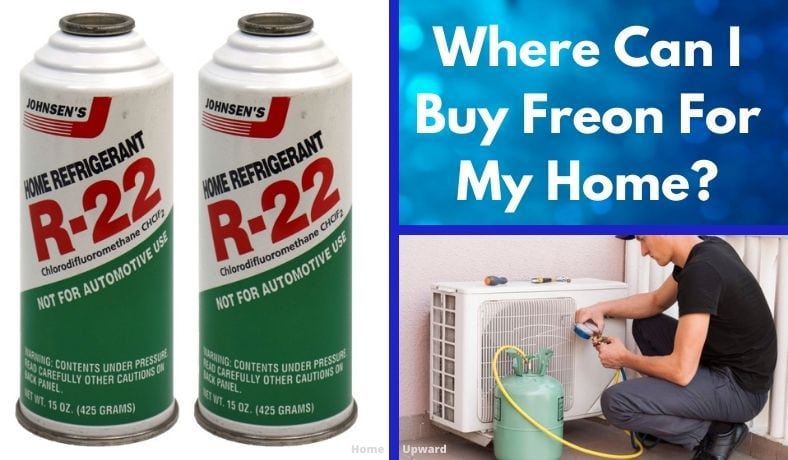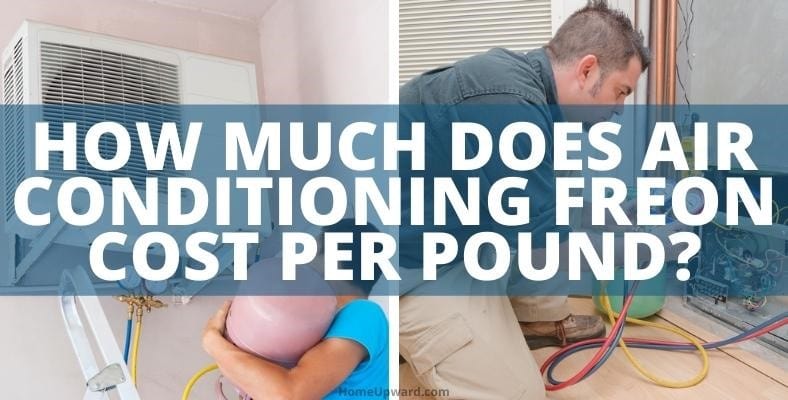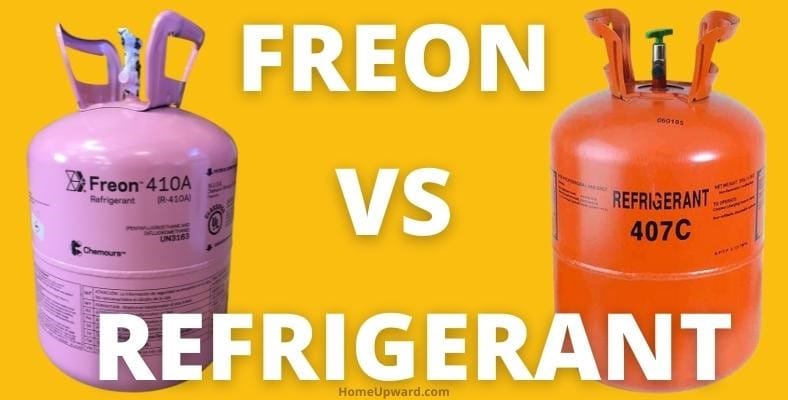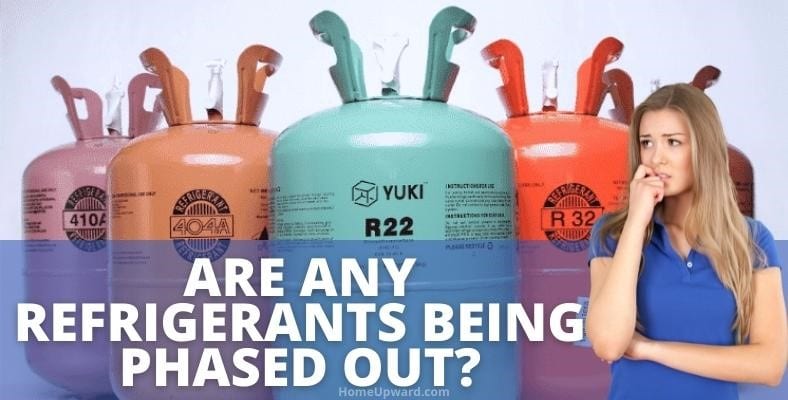Your air conditioning unit is most likely one of the most used appliances in your home. When your air isn’t flowing, or it’s not getting cold, it could be a sign your unit needs to be serviced.
The best thing you can do is to change your freon – but you may be wondering where to buy it, right? Also, what is freon and how does it work?
Keep reading to learn all about freon and how it works in your home.
Contents
Where to buy freon for a home AC unit
Keeping your air conditioning unit running smoothly could save you hundreds, if not thousands, of dollars over time. A top priority for maintaining your AC unit should be the refrigerant of your compressor or Freon.
Depending on the type of refrigerant that you need (see the section below that breaks it out by type,) you can buy freon or refrigerant from many commercial stores.
Places like Walmart and AutoZone carry refrigerant, and certified HVAC supply stores and online retailers often sell. However, but you may not be able to buy freon yourself because there may be some restrictions.
I’ll explain what you need to know as we go.
What is freon?
Just like Kleenex or Chapstick, Freon is actually has a trademark from the E.I. du Pont de Nemours Company. (DuPont is the parent company – freon is often credited to the Chemours Company.)
Freon is a chlorofluorocarbon (CFC), which is a fancy term for a chemical compound that works as a refrigerant. Usually, freons contain gasses or liquids such as:
- Fluorine
- Carbon
- Chlorine
- Hydrogen
- Bromine
Freons are actually a major concern for the environment – Chlorofluorocarbons in sprays, such as hairspray, have been blamed for the damage of the ozone layer.
Freons were developed in the 1930s. They are colorless, odorless, non-corrosive, and don’t easily catch fire. Freons are liquids or gases that have a low boiling point and low stickiness. Basically, they are very, very stable, which makes them great for machinery and processes that need high pressure in manufacturing.
The type of freon we experience in our daily lives is a result of GM and DuPont working together in 1930. (Who also collaborated on a variety of other projects, such as True Blue.)
They developed the colorless gas known as R-22.
How does freon work? What is the purpose of freon?
Freon, in both gas and liquid form, works by spreading air through a cooling system.
Freon is used in freezers, such as chest or upright freezers; air conditioners; food transportation, like cold trucks; cold storage, such as commercial freezers; some large air coolers; and other home, industrial, and commercial uses.
The purpose of freon is to create a gas to liquid to gas that is able to reduce the temperature of the air from inside your home.
How freon works:
- Your AC unit’s compressor compresses the freon gas.
- A little oil combines with the gas for lubrication.
- As the gas is compressed, the pressure increases, which creates heat.
- The now hot gas moves through coils, which lowers its heat and converts it to a liquid.
- The liquid moves through an expansion value, where it then evaporates.
- The new gas now has a lower pressure than before – and very, very cool in temperature.
- The cold gas moves through another round of coils, absorbing the heat the unit took from within your home and outputting the recycled cool air.
From there, your air conditioning unit pumps the air back into your home until the thermostat is lowered.
How long does Freon last?
Technically, Freon will last forever. Since your AC unit is a closed, or sealed, system, the refrigerant will never escape. However, if your unit has a leak, the refrigerant will leak out. This means you will need to change your unit’s refrigerant, and also fix the cause of the leak.
Air conditioner compressors work under a lot of pressure, which wears down the inside of their tubing over time. Leaks happen at one time or the other, but there are steps you can take to prevent leaks.
You would be able to prevent a leak from happening in the first place. However, if you catch it early, you can reduce the amount of refrigerant that is lost.
What’s the cost of freon?
Depending on the type of refrigerant you are using, the price can vary.
When most people say Freon, they are referring to R22, which is gradually out of existence for the R134a or R410a which are much safer for the environment. Brand-new R22 is hard to find, which makes the cost increase as supplies are not stable. However, it is still available from wholesalers and recyclers.
Can I buy R22 freon without a license?
In short, yes, you can buy refrigerants yourself. However, there’s a major exception: you cannot buy R22 Freon without a certification or license. The EPA made a series of rules that started in 1995 and have increased every year, including 2020.
Only technicians that are EPA-certified or companies that have a special certification may buy R22 in quantities over 2 pounds.
There are many restrictions and cautions, so check out the EPA’s full list of regulations for more information.
How much does air conditioning freon cost per pound?
R22 will cost you around $40-$60 per pound from an HVAC supplier. That means a standard, 30-pound bottle will cost you around $1,200-$1,800.
Your local HVAC technician will most likely have a better deal, as they will share the cost of one bottle amongst more than one customer. (You likely don’t need an entire bottle, and freon lasts for a very long time.)
If your unit uses R410A, you can buy a small can (two pounds or less!) at most local supply stores. The cost will vary by season – freon and refrigerants are much cheaper to buy during the winter months when there is little demand, rather than during peak summer months.
How many pounds of freon is in a home AC unit?
In general, your air conditioning unit will use around two pounds of refrigerant. However, many units – especially units that service multi-level apartments – will use up to 15 pounds of freon.
To find out how much your unit uses, follow these steps:
- Do you have any original paperwork or an owner’s manual? This will be the best place to find what type of refrigerant – and how much – you need.
- Check the outside of your unit. A label or plate on the outside may tell you the type and quantity.
- If you can’t find the number in the first two steps, find the model number for your AC unit. Use the internet to look up the manufacturer’s website and how many pounds of refrigerant your unit needs.
A general rule of thumb is 2-4 pounds per ton. That means if you have a 2-ton unit, you will need 8 pounds of refrigerant to completely refill or replace your refrigerant.
Residential units are usually 1 to 5 tons in weight – if it’s bigger than that, the unit is considered commercial-grade, and has different rules.
Speak with a certified HVAC technician to discuss how you can change your unit from Freon to a newer type of refrigerant, or other options for servicing your AC unit.
Difference between Freon and refrigerant
As we mentioned before, Freon is actually a trademarked, name-brand form of refrigerant.
Freon is R22, whereas refrigerant can mean any gas that works to cool the air in your AC unit’s compressor.
Types of Freon
The name-brand Freon is the type of refrigerant most commonly associated with R22. However, R410a is a different, safer HVAC (Heat, Ventilation, and Air Conditioning) refrigerant that has the same purpose as R22.
Commonly known as Puron, this refrigerant is what most AC units have moved to as EPA restrictions on R22 increase.
Types of AC unit refrigerants
HCFCs (Hydrochlorofluorocarbons) like Freon is being phased out for HFCs (Hydrofluorocarbons) that cause less damage to the ozone.
R410a is a mixture of two types of refrigerants: R125 and R32. It works at a higher pressure than R22, so it isn’t a direct alternative for the older gas. It has a better performance rating and is sold by different manufacturers. (The most commonly known is Puron.)
R134a is a refrigerant used in retrofit AC systems in vehicles.
R470c works similarly to R22 and has become a popular retrofit option. It will work in packaged AC units, water chillers, direct expansion systems, as well as ductless split systems.
R404a is mainly used in industrial transport and commercial industries. It has a very large temperature stability range – between -49 degrees Fahrenheit and 59 degrees Fahrenheit – but can cause frostbite if not handled properly.
Are any refrigerants being phased out?
R22 is being phased out by most HVAC suppliers, and no new units that use the refrigerant are being produced.
R410a and R22 cannot be used in place of the other. What does that mean for you? While you can still purchase and service your AC unit that runs on R22, the price to do so will continue to increase year-over-year until stock runs out.
How to replace your AC freon
If your air is on but it’s still too warm in your home, you might be asking yourself “why is my AC no longer blowing cool air?” The first place you may need to look is your AC freon.
Important note: if you are replacing your refrigerant frequently, then you could have a leak. Your AC refrigerant should last about 12-15 years, but that number will vary by use and how efficiently your AC is running. In some cases, the refrigerant your AC unit came with could last a lifetime. In high-heat areas where your unit is being run constantly, that number could be much lower.
Signs you need to replace your AC freon or AC refrigerant
If your air conditioner is blowing warm air when you have set the thermostat to cool, your AC unit likely needs a new refrigerant. Most likely, a refrigerant leak has happened, and it has slowly leaked out over time.
Refrigerant leak prevention tactics include:
- Keep pets and wildlife away from your AC unit. Urine is acidic and can eat through the outside of coils.
- Allow room for cooling. Your AC unit needs about 2 feet of space around it on all sides to vent and cool correctly.
- Protect your AC unit. A small fence or barrier can be helpful in protecting it from intruding plants or animals.
- Conduct regular maintenance. A general rule of thumb is to have your air condition unit serviced every year. A professional HVAC technician should check the thermostat, inspect and tighten connections, lubricate any moving parts, inspect the drain, check the system’s controls, and other HVAC-specific inspection points.
If your condenser coils have a lot of frost build-up or are leaking a lot of water/condensation, then your unit could be low on refrigerant.
If your electric bill is suddenly much higher than you expected or is normal, then your air conditioner may need more refrigerant or to be serviced.
Air conditioning troubleshooting
If your AC unit isn’t running efficiently, it may be time to do some troubleshooting. Before you call an HVAC technician, try these quick troubleshooting techniques:
- Check your unit and the area for dirt. Trash, leaves, pine needles, etc could have gathered inside or around your unit, preventing it from pulling in air.
- Replace your filters. You should replace in-home filters once a month to every 3 months, depending on filter type. A clogged filter can cause your AC to not operate properly.
- Clean the coil. With your hose, hose off the coil and inside of the unit’s lid. Dirt and dust quickly build upon these semi-exposed areas.
- Inspect your ductwork. Leaking ducts can cause water damage, as well as a reduced capacity for your AC unit. If possible, inspect your ductwork, and use ductwork metal tape to seal tears and cracks.
- Measure the electricity’s flow. If you turn the unit on, but no air is blowing, you could have an electricity problem. Check your circuit breaker or fuse box, inspect the thermostat itself, and check your unit itself to ensure a switch has not been accidentally flipped.
- Clean the drain line. As it runs, an AC unit removes moisture from the air which collects as water. If your drain line is backed up or clogged, this could cause your AC unit to back up, not cool properly, and even fail to turn on.
- If the air is not getting cool, check your refrigerants and condenser coils.













